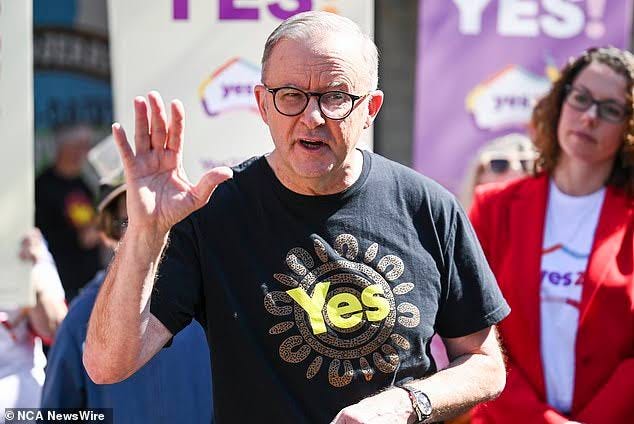Has Prime Minister Anthony Albanese, banked too much of his own political capital on the Voice to Parliament succeeding.
For the PM, October 14, looms not only as a day of reckoning for Australia, but also for himself.
And like the Alamo was General Custer’s last stand, the Voice to Parliament if it fails could be Albo’s.
For the PM, its success is an imperative for his political survival.
The stakes are high for the PM and the Voice to Parliament’s success will not only define his leadership - but it will also be a legacy of fulfilment if Australia votes Yes to enshrine it.
However, if Australia votes ‘No’, has the PM gambled too much on one issue that could sink him politically?
It’s a bold move to give constitutional recognition for Indigenous Australians, and the PM knows he’s staked considerable political collateral on the issue.
As Australia gears up for the October 14 vote, the potential fallout for the PM is enormous.
Failure would almost certainly erode trust in the PM’s leadership and act as a no-confidence vote against the government, especially on matters of significant public interest.
If that’s not enough of a blow to the PM’s ego and confidence, cracks within the Party will begin to open and with it, a possible leadership challenge.
So, it’s not unreasonable to assume the PM would be considerably nervous along with many sleepless nights as the lead up to October 14 nears.
The PM may not openly admit it, but he knows if the ‘Yes’ vote fails, his Prime Ministership and political career in serious trouble - especially amongst his Party members.
Embarrassment and saving reputations see politicians abide by the adage, “In a two-horse race always back self-interest” and you can bet the aftermath in the washup post the referendum will be a bloody affair.
And if there were party members sceptical of the Voice to Parliament as an initiative, its failure will see them move on the PM and seize the opportunity to affect a leadership spill.
Internal party fighting and a sense of, “too great an emphasis was placed on what is perceived to be a divisive issue”, will add to the difficulty to push other policy initiatives, rendering the government ineffective.
Opposition leader Peter Dutton knows the failure of the ‘Yes’ vote could be the PM’s ‘darkest hour’, or the ‘hill he politically dies on’ and which should see Dutton move to quickly capitalise on a major political blunder.
Dutton’s a political opportunist and he will weaponise the ‘Yes’ vote’s failure to discredit the PM and declare Albo as incapable of reading or understanding the mood of Australians.
And Dutton will be within his rights to say so.
Claiming the PM’s scalp will not only be a feather in Dutton’s cap, but it will almost elevate the Australian voting public’s perception of a sadly misunderstood and polarising politician.
Political scalps are always good to have as part of your future prime ministerial ambitions.
Smart savvy politicians can sniff the political winds, and judging by the concern Australians have about the Voice or lack of undersding of what it means or proposes - the PM is failing to sniff those very winds and hear the voices of concern.
The referendum’s failure will almost serve as a potent symbol of policy inadequacy and incompetence - offering Dutton and the Opposition a rallying point for disenchanted voters and inevitably strain relations with Indigenous communities.
That’s what happens when you play with fire.
After investing hope and energy into a framework that for the ‘true believers’ promised constitutional recognition, a failed referendum could deepen criticism among Indigenous Australians about the government's commitment to reconciliation.
Electorally, the implications could manifest in the loss of swing seats at the next federal election.
And in electorates with significant Indigenous populations, the failure might sway public opinion enough to tip the scales in favour of Opposition candidates.
One of the most damaging outcomes could be the loss of bipartisan support for Indigenous issues.
The Voice to Parliament has seen backing from both sides of the aisle, and a ‘No’ vote victory could polarise bipartisan spirit, making future consensus on Indigenous issues more challenging.
Perhaps one of the most daunting consequences would be the PM's accountability for the next steps.
With the referendum off the table, Albo would face enormous pressure to present an alternative path for Indigenous recognition and reconciliation.
If the PM doesn’t adopt that strategy, it would almost delegitimise the government's authority and efficacy in managing complex social issues.
The referendum is more than a single policy issue; it is a litmus test for the PM’s leadership.
Its failure could bring about a cascade of political repercussions for the PM, from diminished public trust and internal party fractures to electoral risks and a weakened international standing.
With so much at stake, October 14 serves not only as a pivotal moment for Indigenous Australians but as a critical juncture for the PM's political career.





Many of our Indigenous tribes are against the Voice... why? we should be careful, there is minimal information on how this affects our constitution and further if the majority of our Indigenous people don't want it, why are we doing this? forcing something on them they hate? It makes no sense unless it's purely political. I sincerely hope Aussies will be smart and vote "no" - when more info is available, they can have another referendum and see if it flies with Australia as a whole. I personally would rather my tax dollar going towards another referendum on this issue rather than paying for the Ukrainian war, submarines for 2050 and the Clinton Foundation... yes, we did pay to that corrupt organisation while our homeless stay homeless.